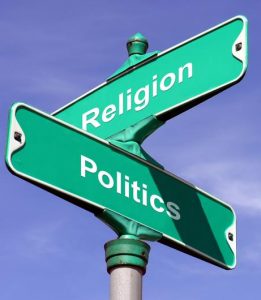(Akiit.com) In America, we often forget the incongruity of living in a free society. Disagreeing with you does not necessarily mean I am right and you are wrong, or vice versa; it just means we don’t see the same set of facts the same way.
That people will agree with you when you agree with them is clearly evident when discussing two topics some have agreed never to discuss – religion and politics. These deeply held beliefs or convictions, though ostensibly disconnected, are actually offshoots of the same root. In fact, one could safely say that one’s politics is the public expression of one’s private religion.
How is this, you say? Because one’s view of his God will determine how one treats his fellow man, and this will subsequently be articulated in the body of rules, regulations, laws and minutiae collectively referred to as “government.”
This is one of the primary factors that contribute to the misunderstanding of the differences between Eastern and Western cultures. Just as the American system of government is based on our Founders’ view of God and religion, the governments in the Middle East are based on their founders’ view of God and religion – i.e., Christianity and Islam.
A nation’s religion (or lack thereof) will be reflected in its politics, as is evidenced in many Muslim uprisings. While some may conclude this is precisely the reason we should never mix religion and politics, politics, in the true sense of the word, is the public application of the privately held religious beliefs of the citizenry at large.
In the American form of government – “government of the people, for the people, by the people” – those who are elected by the people supposedly represent the views of the people who elected them. Consequently, the views – political and religious – of the party in power are purportedly those of the majority of the electorate.
Morality – and thus the policies, procedures, laws and freedoms (or the lack thereof) that contribute to, and are supported by, public opinion – does reflect the presence or absence of the concept of God, as held by the people. Politics and religion (in the biblical sense of the word) are, therefore, inseparable.
Tragically for America, in Washington today, it seems the transcendent truths of right and wrong have been transcended by political expediency. Truth is no longer “the truth” but the rearranging of information to meet the political expediencies of the moment.
An unbiased view of politics today might lead to the conclusion that words like truth, equity, verity, integrity, veracity are not to be taken literally, since, regarding politics, they are only figurative. There are those who honestly believe that such words have no practical value, and no modern application, and should be restricted to religious, ancient or historical documents.
Consequently, a promise should not be construed to imply any degree of permanence. Contracts would be enforceable only by the most skillful attorneys. Value should not be attached to a man’s word. And character should not be a consideration when hiring, or electing, individuals.
From the current state of affairs and the political climate in America, one could draw from the phrase in God we trust a warped perspective of the God in whom we trust.
Based on some public opinion polls, the pontifications of theologians in most liberal colleges, and many editorials in an “unbiased press,” one could conclude that the God of the Bible is really not at all like the God in the Bible. It is all just politics as usual.
“So justice is driven back and righteousness stands at a distance; truth has stumbled in the streets, honesty cannot enter. Truth is nowhere to be found” (Isaiah 59:14-15a).
Columnist; Ben Kinchlow
Official website; http://www.benkinchlow.com









Leave a Reply